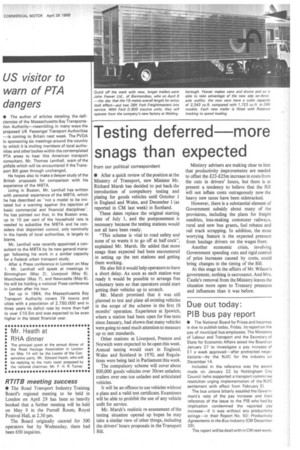Testing deferred more snags than expected
Page 21

If you've noticed an error in this article please click here to report it so we can fix it.
from our political correspondent • After a quick review of the position at the Ministry of Transport, new Minister Mr. Richard Marsh has decided to put back the introduction of compulsory testing and plating for goods vehicles until October 1 in England and Wales, and December 1 (as reported in CM last week) in Scotland.
These dates replace the original starting date of July 1, and the postponement is necessary because the testing stations would not all have been ready.
"This scheme is vital to road safety and none of us wants it to go off at half cock'", explained Mr. Marsh. He added that more snags than expected had been encountered in setting up the test stations and getting them working.
He also felt it would help operators to have a short delay. As soon as each station was ready it would be possible to arrange free voluntary tests so that operators could start getting their vehicles up to scratch.
Mr. Marsh promised that it was still planned to test and plate all existing vehicles in the scope of the scheme in the first 18 months' operation. Experience at Ipswich, where a station had been open for free tests since January, had shown that many vehicles were going to need much attention to measure up to test standards.
Other stations at Liverpool, Preston and Norwich were expected to be open this week. Annual testing would start in England, Wales and Scotland in 1970, and Regulations were being laid in Parliament this week.
The compulsory scheme will cover about 800,000 goods vehicles over 30cwt unladen; trailers over one ton unladen and articulated vehicles.
It will be an offence to use vehicles without a plate and a valid test certificate. Examiners will be able to prohibit the use of any vehicle unfit for service.
Mr. Marsh's realistic re-assessment of the testing situation opened up hopes he may take a similar view of other things, including the drivers' hours proposals in the Transport Bill.
Ministry advisers are making clear to him that productivity improvements are needed to offset the L23-£25m increase in costs from the cuts in drivers' hours, but there is at present a tendency to believe that the Bill will not inflate costs outrageously now the heavy new taxes have been sidetracked.
However, there is a substantial element of Government subsidy about many of the provisions, including the plans for freight sundries, loss-making commuter railways, rural and new bus grants, fuel rebates and rail track scrapping. In addition, the most worrying feature is the expected pressure from haulage drivers on the wages front.
Another economic crisis, involving Government spending cuts and rigid control of price increases caused by costs, could bring changes in the timing of the Bill.
At this stage in the affairs of Mr. Wilson's government, nothing is sacrosanct. And Mrs. Castle's removal from the Ministry leaves the situation more open to Treasury pressures and influences than it was before.




















































































































